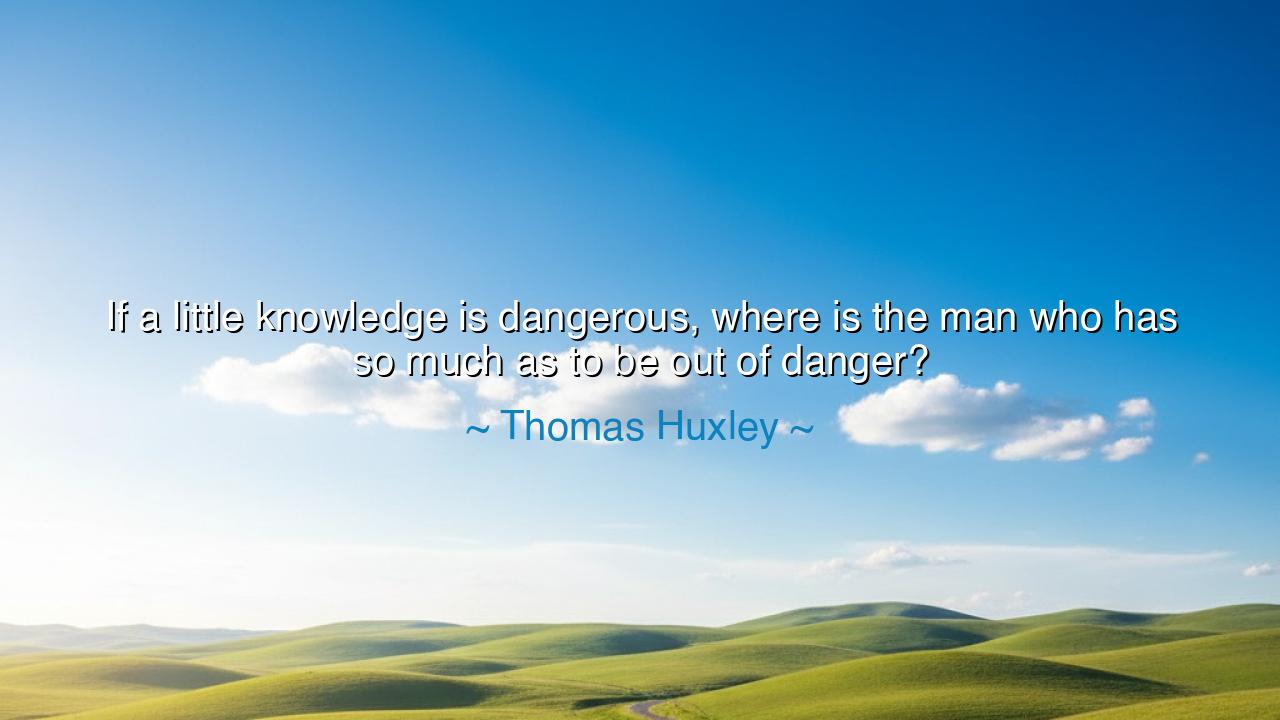
If a little knowledge is dangerous, where is the man who has so
If a little knowledge is dangerous, where is the man who has so much as to be out of danger?






The words of Thomas Huxley, often called “Darwin’s Bulldog” for his fierce defense of science and reason, cut through arrogance like a blade of truth: “If a little knowledge is dangerous, where is the man who has so much as to be out of danger?” In this single sentence, Huxley exposes the illusion of mastery and humbles the proud mind. He reminds us that all human understanding, no matter how vast, remains incomplete—that even the greatest scholar stands, at best, on the shore of an infinite sea. His question is not cynicism, but wisdom. It asks us to walk the path of learning with both courage and humility, to recognize that danger does not come from knowledge itself, but from the belief that one has enough.
The origin of this quote reaches back to the nineteenth century, an age when science was breaking open the secrets of the universe—evolution, geology, electricity, chemistry—and men were daring to think themselves gods of their own making. Yet Huxley, though a man of science, saw the peril in pride. He witnessed how partial truths, wielded by untested minds, could mislead and destroy. To those who parroted the old saying that “a little knowledge is a dangerous thing,” he posed this ironic challenge: if ignorance is safety, and learning brings risk, then where is the soul so wise that it stands beyond danger? The answer, of course, is nowhere. For even the most learned among us, he implied, are but students before the vastness of truth.
Huxley’s question echoes the wisdom of the ancients. Socrates, the Athenian philosopher, once declared that his wisdom lay in knowing he knew nothing. Like Huxley, Socrates understood that the deeper one studies, the more one perceives the boundless unknown. To imagine oneself “out of danger,” armed with final knowledge, is the gravest folly of all. The ignorant may stumble in darkness, but the arrogant fall from great heights. Knowledge without humility becomes a weapon turned inward, a fire that consumes its bearer. Thus, Huxley’s words carry both a warning and a revelation: that wisdom begins not with certainty, but with awe.
Consider the story of Isaac Newton, the giant of science whose laws reshaped the universe. Near the end of his life, he wrote, “I do not know what I may appear to the world, but to myself I seem to have been only like a boy playing on the seashore… while the great ocean of truth lay all undiscovered before me.” Here is the living embodiment of Huxley’s insight: a man of supreme intellect, yet humble enough to know how little he truly grasped. His discoveries illuminated the heavens, yet he still felt the weight of the infinite pressing upon him. Such humility is not weakness—it is the crown of true greatness, the acknowledgment that learning is not a conquest but a pilgrimage.
The danger of little knowledge, as Huxley saw, lies not in knowing too little, but in mistaking the little for the whole. The half-educated man is quick to speak and slow to listen; he builds walls of opinion where wisdom builds bridges of inquiry. History is filled with such examples—leaders who believed themselves infallible, thinkers who dismissed others as fools, nations that mistook their progress for perfection. When knowledge serves pride, it breeds tyranny; when it serves humility, it becomes the foundation of enlightenment. The greatest danger, therefore, is not ignorance itself, but the arrogance that refuses to recognize it.
Huxley’s message, though born in the crucible of scientific discovery, reaches far beyond the laboratories of his age. It speaks to the artist, the philosopher, the teacher, the believer—to anyone who seeks truth. It teaches that the pursuit of knowledge must be matched by self-awareness, that curiosity must be guided by reverence. Every new fact discovered is but a door to deeper mystery. The wise man does not flee this danger; he embraces it, knowing that to learn is to risk, and to risk is to live. For it is better to walk the trembling edge of understanding than to sit comfortably in the shadow of ignorance.
And so, the lesson for all who would walk the path of learning is clear: remain a student forever. Let every discovery humble you. Seek truth not for power, but for wonder. Be wary of certainty, for it is the enemy of growth. Celebrate what you know, but never forget the vastness of what remains unknown. As Huxley’s question implies, none of us shall ever possess so much knowledge as to be beyond danger—but in that very uncertainty lies our nobility. For it is the striving, not the arrival, that makes mankind divine.
Thus, the wisdom of Thomas Huxley endures as a flame in the darkness of pride. His question is not a rebuke to knowledge, but a benediction upon it. To know is to risk; to risk is to grow; to grow is to honor the endlessness of truth. Let every mind that hungers for understanding carry his words as both shield and compass: that no man is ever out of danger, but those who embrace their ignorance with humility walk safest of all—guided not by arrogance, but by the eternal light of wonder.






AAdministratorAdministrator
Welcome, honored guests. Please leave a comment, we will respond soon